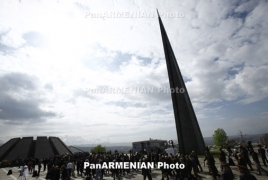Research: Turks, Kurds who reached out to Armenians during Genocide August 21, 2015 - 16:48 AMT PanARMENIAN.Net - The International Raoul Wallenberg Foundation and the Kaloosdian/Mugar Chair at the Strassler Center for Holocaust and Genocide Studies at Clark University together with Professor Taner Akcam have initiated a major research. This vast research project aims at collecting information on those Turks and Kurds that reached out to the victims of the Armenian Genocide. The main mission of the International Raoul Wallenberg Foundation is to unveil untold stories of rescue and solidarity. The issue of the Muslim rescuers who went out of their way to save Armenians at the beginning of the 20th century is an unchartered territory waiting to be discovered, is stated in the preamble of the report. “It is a great honor to join forces with Professor Taner Akcam, a world-renowned Turkish historian and sociologist who has devoted his efforts to try and reconcile the narratives of the Armenian and Turks, and his chair at the Strassler Center for Holocaust and Genocide Studies at Clark University. This is a unique attempt to identify and honor the many Turks and Kurds that lent a hand to their Armenian neighbors in one of the darkest periods of mankind. The Wallenberg Foundation does the same concerning the Holocaust. Rather than focusing on the evil, our NGO strives to highlight the spirit of solidarity of the women and men who, like Raoul Wallenberg, oftentimes risked their own lives to save others. This is our duty towards those saviors and, above all, our obligation to the young generations that should be aware of these role models. The research work conducted in this regard was undertaken in a in-depth and painstaking manner in Muslim (Turkish and Kurdish) provinces where most of the killings occurred, and where most of these stories have been passed on verbally from generation to generation. As promised, the research is now published and presented to the public light in order to be examined and commented by experts and lay readers as well. Recognition of goodness is one of the pillars of our mission, and we are confident that this ambitious research will enable us to add more names to the list of rescuers,” the Foundation said.  The Armenian Genocide The Armenian Genocide (1915-23) was the deliberate and systematic destruction of the Armenian population of the Ottoman Empire during and just after World War I. It was characterized by massacres and deportations, involving forced marches under conditions designed to lead to the death of the deportees, with the total number of deaths reaching 1.5 million. The foreign ministers of Armenia and Azerbaijan, Ararat Mirzoyan and Jeyhun Bayramov, have arrived in Washington. The CSTO budget for the current year requires adjustments due to the refusal of Yerevan to pay their share of contributions. Six total incidents have burned 19 old-growth trees. Friday night 8 trees were torched along the beautiful main entrance. The EU does not intend to conduct military exercises with Armenia, Lead Spokesperson for EU Foreign Affairs and Security Policy Peter Stano says. Partner news |